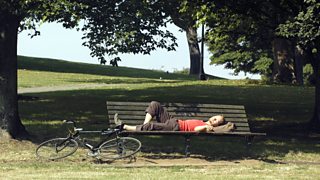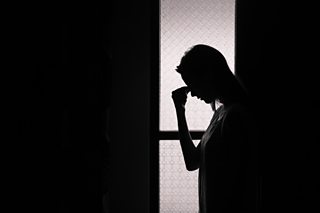Nine fascinating facts about the history of exhaustion
Are we really more exhausted today than we have ever been before? Do emails, social media and smartphones mean unprecedented levels of burn-out?
In Exhaustion: A History, writer and broadcaster Philip Ball sets out on a journey to discover a forgotten history of listlessness and fatigue and to chart the forgotten story of exhaustion – from desert dwelling monks to today’s world of work. It turns out that being exhausted is nothing new.
Read on for some fascinating facts about being tired out throughout the ages – if you can stay awake long enough…
-
![]()
Seriously... Exhaustion: A History
Philip Ball charts the forgotten story of listlessness, burn-out and fatigue.

1. The Ancient Greeks thought exhaustion was caused by an excess of black bile in the body
The preoccupation with exhaustion goes all the way back to Greek antiquity. In the Greek golden age of the 5th to the 3rd centuries BC, most doctors believed that our health was governed by a balance in four fluids called humours that circulated around the body: blood, black and yellow bile, and phlegm. Several centuries later, famous Greek physician Galen was still blaming exhaustion on an imbalance in these humours. Anna Katharina Schaffner, whose written a history of exhaustion, explains: “He thought that exhaustion was caused by a surplus of black bile, and that the body was then trying to burn black bile and the dust would rise up from the stomach to the brain and quite literally cloud the sufferer’s vision of the world.”
2. For early Christians, exhaustion was a spiritual danger
In the fourth century AD, there were early Christian monks and nuns living often solitary lives in monastic communities in the wildness of Northern Egypt. Despite seeking a spiritual life of contemplation, it’s fair to say that feeling bored and listless wasn’t uncommon.
Feelings of lethargy were seen as a spiritual danger.
These feelings of lethargy were seen as a spiritual danger and there was even a name for it: “Acedia”. “Acedia refers to a demonic force that comes in the middle of the day,” says Professor of History Andrew Crislip. “It comes to have the nickname among Christians as the ‘Noon-Day Demon’”. The most famous expositor of this evil thought or sin was a monk called Evagrius of Pontus. He even developed a system of counselling and psychology to care for people suffering from the perils of despondency.
3. Exhaustion is one of the seven deadly sins
The 8 evils that Evagrius wrote about became transformed in the Middle Ages to the seven deadly sins. Acedia is still there, but now this spiritual apathy is called “sloth.” At this point it was all about whether you were working hard enough for your own salvation. To be exhausted, and therefore idle, was seen as a moral failing.
4. Renaissance scholars blamed exhaustion on Saturn
By the Renaissance there was another opinion. An Italian philosopher called Marsilio Ficino believed there was an overlap between exhaustion and what we would now call depression. Valery Rees, a Renaissance historian, has translated his letters. “He generally calls it melancholy, which is an imbalance of the humours in the body and causes heaviness, coldness, lethargy, misery,” says Valery.
The humours were thought to be affected by celestial forces and, for Marsilio, the planet causing melancholy was cold, slow-moving Saturn.

5. The Victorians believed exhaustion was caused by sexual impropriety
In the 18th century, exhaustion became considered a medical result of spiritual or moral shortcomings – not least to do with sex. The symptoms of lethargy and exhaustion was seen as evidence of sexual degeneracy. Doctors came to link exhaustion to improper sexual activities and began to make medical arguments about the dangers of those kinds of behaviours.
6. Exhaustion also became linked to vampirism
In the 19th Century, vampires entered popular culture, and they came to be linked to exhaustion. Professor Nick Groom of Exeter University explains how in Gothic tales like Carmilla and Dracula, the vampires’ victims become languid, exhausted, listless and haggard. “What we’re seeing here is medical science trying to make sense of symptoms of tiredness and then projecting these immaterial symptoms on to a figure,” says Nick. But these vampire stories also provided a moral lesson. There’s the sense that the alluring encounters between the vampires and their female victims were a warning about engaging in illicit sexual activities.
7. Later on, it was thought that too much brainwork caused exhaustion
Doctors decided that exhaustion was all to do with, not blood, but nerves. (We still have this association today: to feel tired is to feel “enervated” – nerveless.) In the 1880s an American doctor named George Beard popularised a name for this condition: “neurasthenia.” In Beard’s view, nerves got weakened, much like ropes do, by putting too much strain on them – through too much thinking.
According to 1880s American doctor George Beard, nerves got weakened, much like ropes do, by putting too much strain on them – through too much thinking.
His neurasthenia was seen as an affliction of sensitive, creative and refined types who had engaged in too much brainwork and being tired came to be seen as something of a social distinction.
By the same token, people who led undemanding mental lives like manual labourers were deemed not to suffer from exhaustion.
And it wasn’t considered a problem for non-European races either, who were thought not to have the same mental refinement. Exhaustion became a vehicle for propping up social prejudices and the status quo – including colonialism.
8. Exhaustion was used to keep women in their place
Exhaustion became a gender issue too. In 1874 the British psychiatrist Henry Maudsley wrote that everyone has a limited amount of bodily energy and women’s energy is mostly focused on their reproductive system – as this is their main function in society. According to Maudsley, women squandering their energies on pursuits like reading, writing and studying would therefore likely hinder their reproductive abilities. Some doctors suggested that women who went out and engaged their brains, and – God forbid – actually worked, would then suffer terrible physical consequences – even death.

9. Freud blamed exhaustion on the repression of our true desires
According to Sigmund Freud’s psychoanalytical take on exhaustion, it’s civilisation itself that’s sapping our energy. Freud argued that just living in a civilised culture can be exhausting because we’re using up so much energy repressing all of our socially unacceptable desires, views and wishes. He also said we can use up energy on internal conflicts: our ego, super-ego and id are constantly doing battle inside us.
More from Seriously...
-
![]()
If you were given free money to spend – what would you buy?
The sometimes surprising ways East Germans spent 'Begrüßungsgeld' windfall from the west.
-
![]()
The Hidden Story of British Slavery
The alarming truth about slavery in modern Britain.
-
![]()
11 niche jobs that actually exist
Bizarrely specific jobs that are somehow real.
-
![]()
At what age should someone be allowed to marry?
How young is too young to get married?





